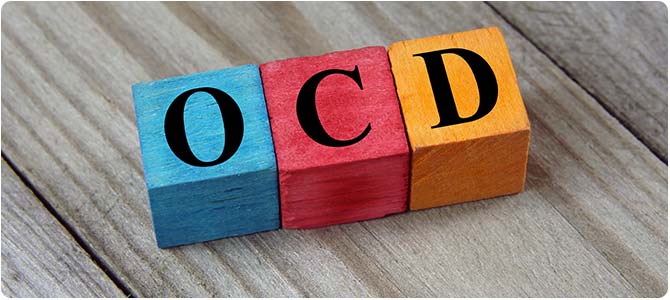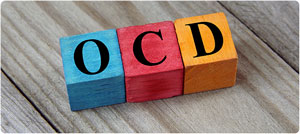OCD Specialist in Phoenix, AZ
Obsessive Compulsive Disorder (OCD) can affect people of all ages. It is related to compulsion and obsession. Some symptoms of OCD include an obsession with cleanliness, uncontrollable recurring thoughts, and taking a lot of time to complete a routine task. With the right combination of psychotherapy and medication management, an OCD specialist can treat you. At Jade Health and Wellness, our therapist, Dr. Courtney Gaines provides effective treatment solutions to your OCD problems. Her extensive experience in inpatient and outpatient settings helps her treat her patients with care. For more information, contact us today or book an appointment online. We are conveniently located at 2375 East Camelback RD Suite 600 Phoenix, AZ 85016.


Table of Contents:
What are the main symptoms of OCD?
What are the 4 types of OCD?
Is online therapy effective for OCD?
What kind of therapist do I need for OCD?
OCD is short for obsessive-compulsive disorder, which is a disorder that includes both obsessions and compulsions; however, it’s still possible to have one or other symptoms. Many of our patients don’t even know they are dealing with excessive or even unreasonable obsessions and compulsions, but if they are taking up a large chunk of your time and often interfere with your daily life, social, school, or work routines, it’s an issue.
Obsessive-compulsive disorders are often repeated, they are persistent and warrant unwanted thoughts, urges, or images that can be quite intrusive, which often causes the patient a lot of distress or anxiety.
Obsessions are known to have themes associated with them:
• Fear of dirt or contamination
• Doubt or struggling with the thought of tolerating uncertainty
• Needing everything in an orderly form and symmetrical fashion
• Horrible and aggressive thoughts about harming yourself or others
• Unwanted thoughts, which may include aggression, sexual subjects, or religious subjects
Compulsions also have themes, just like obsessions do:
• Washing
• Cleaning
• Checking
• Counting
• Orderliness
• Strict routines
• Demanding reassurance
There are four dimensions (also known as types) of obsessive-compulsive disorder that are often diagnosed:
1. Contamination
Contamination is often focused on excessive cleaning or washing of everything. This is driven by a fear of contamination due to germs and bacteria; they go to extreme lengths to avoid any situations that may lead to exposure.
2. Perfection
Perfection is often focused on symmetry, having order, and exactness with everything. Individuals will spend an innate amount of time arranging things, moving, or counting things to alleviate their discomfort. The endless perfection persona can become exhausting physically, mentally, and emotionally.
3. Doubt/harm
Doubt and harm have an obsession with checking and then re-checking again things around them like their doors, alarm systems, windows, etc. These individuals’ doubt and harm type of OCD stems from their experiences of intrusive thoughts, images, or urges about fear of accidentally harming themselves, or someone else, or someone harming them.
4. Forbidden thoughts
Forbidden thoughts are focused on taboo-type thinking. This stems from unwanted and intrusive thoughts which can often be violent, religious, or sexual which can violate this individual’s morals or values.
It should be noted, that there are additional types that are much rarer:
• Staring OCD
• Relationship OCD
• Existential OCD
Online therapy is available and can be very effective for individuals dealing with obsessive-compulsive disorder. Online therapy can be offered anywhere you are, whether it be in the comfort of your own home, at a library, or at a coffee shop. As long as you have an area that you feel most comfortable with, that is quiet, where you can focus on the online therapy for your obsessive-compulsive disorder, it’s effective. Many prefer to do this within the comforts of their own home, as this is where they feel safest, and most comfortable, and they can truly express themselves fully without the need of keeping things in due to not feeling comfortable.
Cognitive-behavioral therapy (known in short as CBT) is a type of psychotherapy that is often effective for many who are dealing with obsessive-compulsive disorder. A component of cognitive-behavioral therapy called exposure and response prevention involves the individual gradually being exposed to their feared object or obsession and will teach you to learn ways to resist the urge to start with their compulsive rituals.
On top of cognitive behavioral therapy, medications can also be used to help control the obsessions and compulsions that occur with obsessive-compulsive disorder.
If you are looking for online therapy for OCD, contact us today or book an appointment online. We are conveniently located at 2375 East Camelback RD Suite 600 Phoenix, AZ 85016. We serve patients from Phoenix AZ, Scottsdale AZ, Paradise Valley AZ, Alhambra AZ, Tempe AZ, and surrounding areas.


Additional Services You May Need
▸ ADHD/ADD
▸ Anxiety Disorders
▸ Bipolar Disorders
▸ Borderline Personality Disorder
▸ Depression Disorders
▸ Eating Disorder
▸ Grief Therapy
▸ Life Coaching
▸ Men’s Mental Health
▸ Mental Health Therapy
▸ Mood Disorders
▸ OCD Disorders
▸ PTSD Disorders
▸ Panic Disorders
▸ Stress Disorders
▸ Talk Therapy
▸ Women’s Mental Health
▸ Social Phobia


